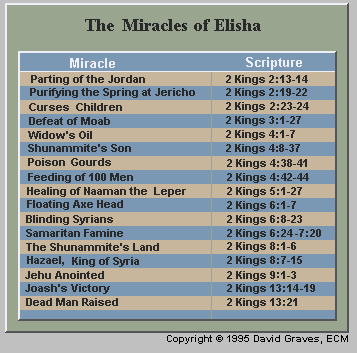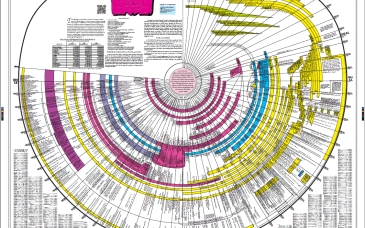Description
The term miracle is a general term used to describe extraordinary workings of God in the world during certain times of man's history. However there are several terms used in Greek and Hebrew to describe what is commonly called miracle.


Marvellous Works
It is a work of God which catches our attention by the fact of its unusualness. Certainly all of God's works are marvellous but a miracle awakens our dullness to credit this act to the hand of God. Miracles are given special attention because they arouse our dullness. Revelation 17:6
Signs and Wonders
Wonders are splendid works or deeds that stand out because of their display of great power and wisdom. Hebrews 2:4 Signs are tokens of Divine authority and power.
Mighty Works
These are sometimes called wonderful works. Acts 2:11 The works of God are synonymous with wonders and described as Marvellous. Sometimes the word dunamis is used. The word dynamite comes from it and conveys the idea of powerful deeds or works. Acts 2:22
Definition
Natural and Supernatural
One of the difficult things is to try and define what a miracle is. Theologians have tried to put a proper definition to them for some time however each has its own inadequacies.
Some have tried to make a distinction between the natural and the supernatural work of God. While this is helpful, it does not clarify things. In Psalm 107:22-31 the natural is spoken of in the same manner as miracles. They both are considered the works of God and wonders. Both the natural and the supernatural are the products of God's providential hand as he governs and sustains all things. So the distinction is not really between the natural and the supernatural because God works freely and wonderfully in both.
Direct and Indirect
Some say that God works directly through nature and indirectly in miracles. However God works directly in both cases. It is the doctrine of the providence of God and preservation. God works directly on the being of all things. He bears them by his almighty hand, causes them to exist and have breath from moment to moment. God works directly in all things to bring about His eternal purposes and to uphold all things. Romans 11:36
No Explanation
A distinction is sometimes made by saying that we are unable to comprehend and explain a miracle. It was a mystery how God raised Lazareth from the dead. However this is no more beyond our understanding than a child being born and God's actions in this. It is beyond our comprehension when God raises the sun in the morning, as well as when the sun and moon stood still at the word of Joshua. The wonders and common acts are both beyond comprehension.
Distinction
A proposed explanation can be found in that we have become so accustomed to seeing God's work in everyday life that the wonders or miracles of God stand out as uncommon. The problem is in our dullness of senses where man does not notice the hand of God in the everyday providential workings of God's omnipotent power. In a miracle we are startled and it catches our attention and man makes note of it as special and extraordinary. However where God is concerned it is as ordinary and usual as his daily care.
Purpose
Miracles must always be understood in their relationship with their purpose. To remove them from their mooring in God's work of Salvation is to destroy their divine benefit.
Miracles have three purposes as set out in the Scriptures.
Accredit a Message
Accredit a message which accompanied it. John 20:30 The message was given credibility by the miracles which were performed around them. The miracle is always to be evaluated by the accuracy of the message and not the other way around. Deuteronomy 13:1 If someone performs a so called miracle but preaches rebellion or herecy then they are not to be believed. He is not to be believed because he does miracles, but because his message is true.
Accredit the Messenger
Accredit the messenger. The messenger himself was given credibility as coming from God by means of the miracles which they performed. The apostles were given Divine credibility partly by the miracles which they performed.
Signs
A miracle may be a sign which points to a future event or be the fulfillment itself. The virgin birth was foretold and the miracle was the actual fulfillment. Isaiah 7:14; Matthew 1:25
The purpose for miracles or wonders can never be separated from the area of God's salvation and grace. When Israel passed through the Red Sea the question is not whether this is a natural or supernatural act of God, still less whether God acted directly or indirectly, but that in seeing the act men might see the salvation of the Lord. Exodus 14:13 God makes a path for His people through the sea and redeems them from the bondage of Egypt in order to lead them to the Canaan Rest. Hebrews 3:18 When Christ healed the sick he also forgave them their sins. Luke 5:20
The importance in miracles is in the effect that they produce rather than knowing precisely how they came about. And the affect miracles are to have on men is praise and worship. Psalm 106
Periods
One would think that miracles are described on every page of the Scriptures but in actual fact there are only four basic periods in Biblical history when miracles were performed. And each of their appearances are in keeping with the purposes set out under the Purposes of Miracles.
Exodus
The first period is the redemption of God's people from Egypt and their establishment in Canaan under Moses and Joshua. Plaques of Egypt, parting of the Red Sea, Manna from heaven, and the falling of Jericho.
Elijah
For further study see Elijah Topic
Then miracles again were brought back during the life and death struggle of the true religion against the ungodliness of the prophets of Baal under Elijah and Elisha. Healing of the sick, multiplication of food, supernatural phenomena in burning up the wet sacrifice of the prophets of Baal.
Exile
For further study see Exile Topic
During Daniel's time Jehovah brought proof of His power and supremacy over the gods of the heathen. Fiery furnace, and lions den.
New Covenant
With the introduction of the new Covenant there was the promise of Miracles, dreams and visions during the elementary period of Christianity. These were aids to faith and belonged to the early stages of revelation. They gave credibility to the message and the messenger.
Qualifications
The question is often asked what is a real miracle? Or what is the difference between real and counterfeit miracles?
This question assumes that there are false miracles. Scripture teaches that Evil agents can perform miracles but they are false. Jesus warns against the deceptive use of miracles. Matthew 24:24; 2 Thessalonians 2:9; Revelation 13:14; 16:14; 19:20
The following are qualifications to identify genuine miracles from God.
True Message
Workers of wonders must teach truths consistent with the Word of God and demonstrate the character of God. If they contradicts the doctrines of the Bible then it is considered a deceptive wonder. Matthew 7:22; Deuteronomy 13:1 .
Hold to the Purpose
Does it accredit the message and the messenger. Does the miracle fulfil the purpose of miracles. God does not waste miracles. Is God revealed and praised? It must always be remembered that miracles and revelation are joined together and where one ceases so does the other. If the Word of God is complete and not to be added to as is stated in Revelation 22:18, then miracles must also cease in their capacity as message bearers. Miracles are revelations themselves.
Character of Witness
Miracles are established as true or false as they are witnessed to by the character and qualifications of the workers. Ungodly men do not perform true miracles.
Points to Grace
Finally do the miracles point to the salvation and grace of God. All Scriptural miracles pointed to the miracle of miracles the salvation of sinners by the grace of God. All miracles are eclipsed by this supreme demonstration of the might and power of God over death and hell. All miracles give expression to the wonder of wonders found in salvation. The spiritual blind given sight, the sin sick sinner who is healed, the deaf who hear the sweet sound of the Gospel, the dead in trespasses and sins made alive to God, and every other disease which is the consequence of sin which is reversed spiritually is pointed to in every miracles which has ever been performed. Miracles point to the sovereignty of God grace and power. God be praised!
